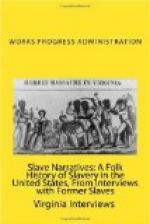“Dere in Loos’anna we doan get no pay ’til de work is laid by. Den we’se paid big money, no nickels. Mos’ of de cullud mens go back to where dey was raised.
“Dat was afte’ freedom, but my daddy say dat de niggers earn money on Old Boss’ place even durin’ slav’ry. He give ’em every other Sat’dy fer deyse’ves. Dey cut cordwood fer Boss, wimmens an’ all. Mos’ of de mens cut two cords a day an’ de wimmens one. Boss paid ’em a dollar a cord. Dey save dat money, fer dey doan have to pay it out fer nothin’. Big Boss didn’ fail to feed us good an’ give us our work clo’es. An’ he paid de doctor bills. Some cullud men saved enough to buy deyse’ves frum Boss, as free as I is now.
“Slav’ry was better in some ways ’an things is now. We allus got plen’y ter eat, which we doan now. We can’t make but fo’ bits a day workin’ out now, an’ ‘at doan buy nothin’ at de sto’. Co’se Boss only give us work clo’es. When I was a kid I got two os’berg[FN: Osnaberg: the cheapest grade of cotton cloth] shirts a year. I never wo’ no shoes. I didn’ know whut a shoe was made fer, ’til I’se twelve or thirteen. We’d go rabbit huntin’ barefoot in de snow.
“Didn’ wear no Sunday clo’es. Dey wa’nt made fer me, ’cause I had nowhere ter go. You better not let Boss ketch you off’n de place, less’n he give you a pass to go. My Boss didn’ ’low us to go to church, er to pray er sing. Iffen he ketched us prayin’ er singin’ he whupped us. He better not ketch you with a book in yo’ han’. Didn’ ’low it. I doan know whut de reason was. Jess meanness, I reckin. I doan b’lieve my marster ever went to church in his life, but he wa’nt mean to his niggers, ’cept fer doin’ things he doan ‘low us to. He didn’ care fer nothin’ ’cept farmin’.
“Dere wa’nt no schools fer cullud people den. We didn’ know whut a school was. I never did learn to read.
“We didn’ have no mattresses on our beds like we has now. De chullun slep’ under de big high beds, on sacks. We was put under dem beds ’bout eight o’clock, an’ we’d jes better not say nothin’ er make no noise afte’ den. All de cullud folks slep’ on croker sacks full of hay er straw.
“Did I ever see any niggers punished? Yessum, I sho’ has. Whupped an’ chained too. Day was whupped ’til de blood come, ’til dey back split all to pieces. Den it was washed off wid salt, an’ de nigger was put right back in de fiel’. Dey was whupped fer runnin’ away. Sometimes dey run afte’ ’em fer days an nights with dem big old blood houn’s. Heap o’ people doan b’lieve dis. But I does, ’cause I seed it myse’f.
“I’se lived here forty-five years, an’ chipped turpentine mos’ all my life since I was free.
“I’se had three wives. I didn’ have no weddin’s, but I mar’ied ’em ’cordin to law. I woan stay with one no other way. My fust two wives is dead. Liza an’ me has been mar’ied ’bout ’leven years. I never had but one chile, an’ ‘at by my fust wife, an’ he’s dead. But my other two wives had been mar’ied befo’, an’ had chullun. ‘Simon here,’ pointing to a big buck of fifty-five sitting on the front porch, ’is Liza’s oldest boy.’”




